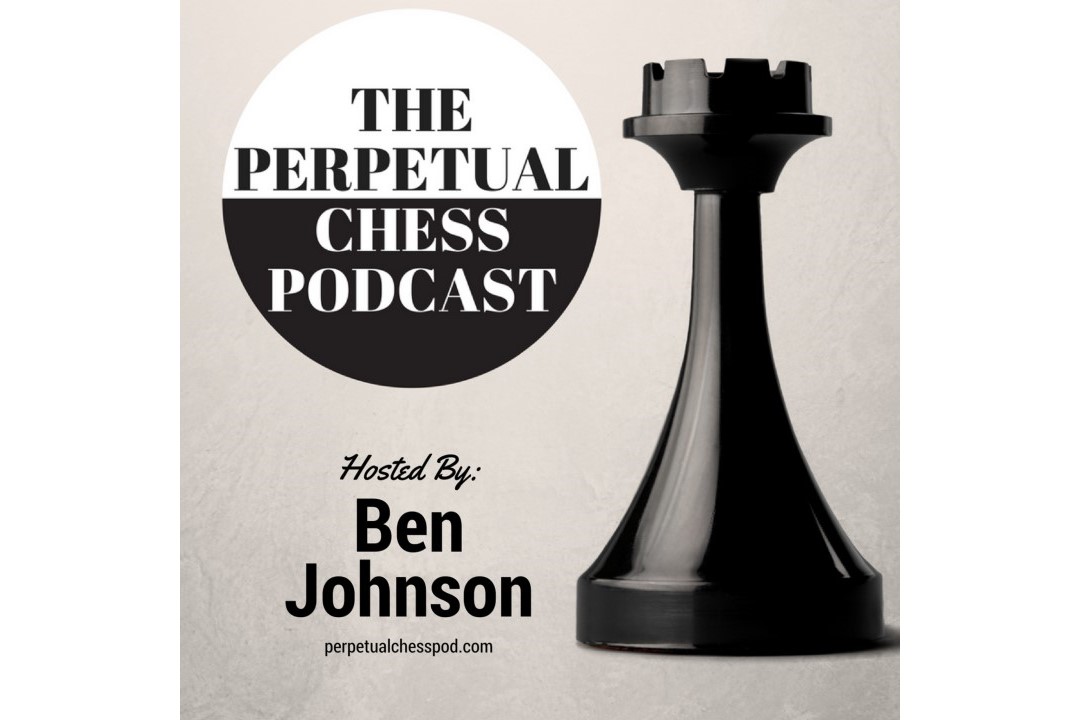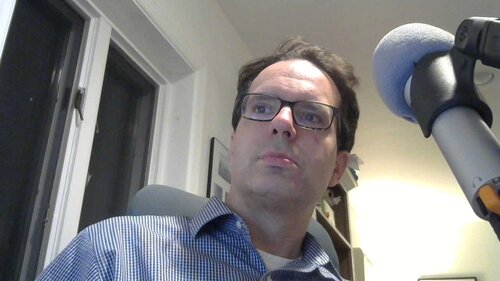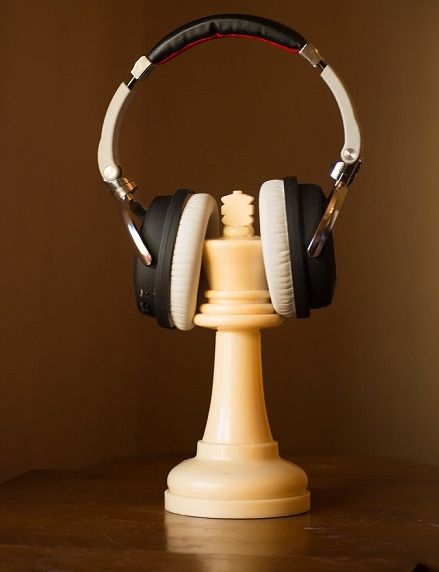


Ben Johnson launched the Perpetual Chess Podcast in December 2016, frustrated by the lack of audio-only chess content on the web. Almost five years in, the podcast has been downloaded/streamed close to a million times, with listeners hailing from over a hundred different countries.
Johnson has hosted no fewer than 193 episodes, interviewing, among others, top-level players like Vishy Anand, Judit Polgar, Hikaru Nakamura and Rustam Kasimdzhanov; well-known chess authors such as Jacob Aagaard, Jonathan Rowson and Joel Benjamin; and famous streamers and online personalities like John Bartholomew, Daniel Naroditsky and Simon Williams. Just to name a few.
As his popularity raised, a couple of new sections were added to the mix, particularly a list of book recommendations by the guests and a series that focuses on adult improvers.
This is how the author describes himself on his website:
As for me, I am a decent but flawed chess player (FIDE 2150ish). I am one of those people who fell in love with the game as a teen and became obsessed with it. At the age of 18, I earned the title of USCF Master, but my chess skills pretty much peaked there and I have lost or “lent out” some rating points in subsequent years.

When and how did you get the idea to create the podcast?
First off, I want to say thanks for the interview, Carlos. I have been reading ChessBase.com for decades, so I am honored to be featured. As for the birth of the Perpetual Chess, sometime in 2015 I started teaching scholastic chess programs after a long time working in other fields. I was driving around a lot to teach at different schools, and started to love listening to podcasts while driving. I noticed there was very little in the way of chess podcasts, and ultimately decided to attempt to fill that void myself.
 You have chosen ten episodes for new listeners to get a general idea of what the podcast is about. It must have been difficult to choose only ten! How did you do it?
You have chosen ten episodes for new listeners to get a general idea of what the podcast is about. It must have been difficult to choose only ten! How did you do it?
Funny you should ask, a dedicated listener recently started helping me with the website, and he gets the credit for making that page. It was very hard to pick ten episodes. I ultimately decided to focus more on diversity of guest type rather than picking my absolute favorites.
I also intend to change that list over time.
Which episode would you say is the “hidden gem” from the show so far? i.e. An episode that might be less popular than others but has great content in your estimation.
I am going to go with Uncle Yermo aka GM Alex Yermolinsky, way back on Episode 15. Part of what I love about chess is its global appeal, and I am a total sucker for tales of leaving one place to make a fresh start in another country. It’s been a while since I listened, but Alex told the amazing story of his coming to the US with nothing, working any job he could and eventually using his formidable chess skills to build a comfortable life here. And of course it didn’t hurt that he is a modest but funny guy with great chess knowledge to boot.
Can you name three players from the past that you would have loved to have as guests on your podcast? Why did you choose them?
Fun question! Well one for sure, as I mentioned on a recent podcast is Miguel Najdorf. He has the most compelling immigration tale of them all, then built a successful life in Argentina, was an incredible player, and had stories of playing the likes of Churchill, Che Guevara and Fidel Castro — what could be better? Boris Spassky is another I would love to interview since he lived so much chess history (of course he is still alive, but I don’t think the interview will happen). Lastly, in an imaginary world where they would speak freely, I would love to interview someone who was deeply embedded in the Soviet chess machine, like an Alexander Kotov or Yuri Averbakh.
Your list of book recommendations got too long for you to keep updating it! Off the top of your head, which three books had the biggest influence on you as a chess player?
Ah yes, I hope to organize and resurrect that book list some day. The most influential for me were The Seven Deadly Chess Sins for its worldly view of the human chess struggle, Masters of the Chessboard for its mix of history and strategy, and Capablanca’s Chess Endings, for its elegant simplicity.
What are your ambitions as a chess player? After having talked to so many talented adult improvers, you are in a great position to make a huge leap forward in your game.
That gets to the question of skills versus knowledge — my knowledge of chess has exploded from hosting Perpetual Chess, but only grunt work will give you the chess skills that actually win games. I have been studying for a handful of hours per week, but my current life circumstances don’t really allow me to push harder. So my current goal is to get my USCF rating back to 2200 within a couple of years. (For context, it peaked around 2270 in my late teens, and has fallen all the way to 2140 or so.) Any bigger goals would probably have to wait until my kids are significantly older.
Who would you like to see becoming the next world champion and why? If Magnus ever loses the crown, of course.
I have tremendous respect for what Magnus has done to normalize and humanize chess genius, and therefore to promote the game, so I would just want it to be someone who could carry that momentum forward. Do you like how I dodged that question? :)
After having talked to a number of players that either were seconds or played in World Championship matches, what changes do you think should be made to the format used at the moment? Are 14 games enough, what do you think about the tiebreak system, etc?
I think 16 games with fewer rest days and a slightly faster time control would be great, and FIDE clearly should make it a priority that there always be games on Saturdays and Sundays in order to maximize chess fans’ interest and ability to watch the games. That would mean a schedule with games on Tuesday, Wednesday, Thursday, Saturday and Sunday or something.
The tiebreak question I know is a contentious issue, but I think the current 4 rapid game setup is reasonable.
You wrote “Proud dad and husband” in your Twitter account's description. Do your kids play chess? Are you planning on encouraging them to get really involved in the game?
I have taught my 7-year-old son to play and I run a chess club at his school, but so far he shows little interest in tournaments. My daughter is only 4, but I hope to expose her to the game in the next year or two to see if she likes it. I love chess, but if my kids are not showing an organic interest in the game I would rather they find their own beloved hobby rather than force them to take up mine.
Thank you for the interview, Ben!
About two years ago, ChessBase’s co-founder Frederic Friedel was a guest on the show. You'll learn how ChessBase came to be, how Vladimir Kramnik felt about an early version of Fritz, what endgame kept Peter Leko up at night, which Leonard Barden book Frederic keeps in arms reach, and much more.
The full 75-minute conversation is available via Perpetual Chess: